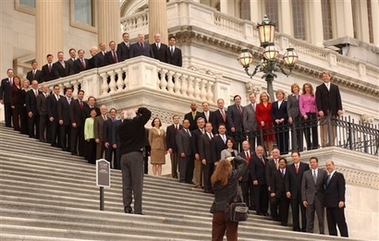Running against Washington means you're predisposed not to help it
 Members of the freshman class of the 110th Congress pose on the steps of the Capitol in Washington, Tuesday, Nov. 14, 2006. (AP Photo/Dennis Cook)
Members of the freshman class of the 110th Congress pose on the steps of the Capitol in Washington, Tuesday, Nov. 14, 2006. (AP Photo/Dennis Cook)A major problem that DC has vis-a-vis the Federal Government (besides how the Constitution outlines the control of Congress over the Federal District) is the fact that most Congresspeople shape their campaigns about how they are going to clean up, change, not be poisoned by, etc., WASHINGTON.
That means that they come here thinking bad thoughts about the city, and they are not likely to be predisposed to help make the city more beautiful.
Then there is the issue of planning for the city. I mentioned that Cameron Logan at GWU is writing his dissertation on planning in the city over the last 50 years. His dissertation is "The Constituent Landscape," which takes off from the time (in 1950) when the National Capital Planning Commission first acknowledged that it was also important to plan for the quality of life of the city's residents, rather than to merely focus on the needs and demands of the federal government.
Today's Post has an article about the new Congress, and the prominence of various local legislators and how that may help raise the awareness of various regional issues and get them on (or back on) the agenda. See "Area Hoping to Cash In on Hill," subtitled "Power Shift Could Bring D.C. and Region Long-Sought Change."
Congresspeople from the region tend to be good advocates for regional issues, but they do put their home state concerns ahead of DC's, at least for the most part.
David McIvor of the Toronto Star wrote an excellent piece about this broad issue, Canada vs. Toronto, in the piece "How to sell the detested city: Toronto's mayor must think about improving the image of a city that other Canadians love to hate." Similarly, Christopher Hume wrote a piece about this broad issue, "City victim of dysfunction," looking at the failure of Toronto to continue with its bid for the 2016 World's Fair.
From the McIvor article:
We have all lived through a scene like the following: Toronto is pitted against other Canadian cities in a national awards ceremony and does not take first place. The winning proponent stands at the podium and declares triumphantly that "whipping Toronto's ass" in this competition has brought him to new heights of ecstasy. The crowd bursts into thunderous applause, and the evening ends on a high.
The Torontonians in the crowd slink out of the room listlessly, often consoling themselves that what occurred was nothing more than blatant jealousy, and the reference to Toronto was, in fact, some warped form of respect. Too bad it's not true.
The hatred of Toronto is often said to be one of the few unifying forces in the highly fragmented nation we live in. This is hardly new: Albertans seeking funding for oil exploration seven decades ago were turned down by Bay Street and had to go to Wall Street to get their funds.
This sounds painfully familiar. E.g., Michael Steele's campaign against Washington, and then how he lorded it over his opponent, from Baltimore, that he was more familiar with DC area issues, and their importance.
The points in the Hume article are also apt to our situation in the U.S.:
Canadian unity remains as much an issue as ever, though now the battles are between governments, not English and French. The cities fight the provinces, which in turn are fighting the federal government, which is fighting back against both. The only thing that comes close to uniting the country is its deep and abiding hatred of Toronto. Even in Ontario, the dislike of Hogtown makes it next to impossible for the city to be treated fairly, let alone intelligently, by Queen's Park. (If Toronto gets something, then what about Thunder Bay, Timmins or Moosonee?)
Though some would argue that World's Fairs are a thing of the past, Canadian self-loathing has a bright future ahead. Intergovernmental fighting now forms the substance of political dialogue in this country. Whether it's Newfoundland, Alberta or Ontario, literacy programs, resource revenues or the fiscal imbalance, Canada is a country at war with itself.
This sentence: "Intergovernmental fighting now forms the substance of political dialogue in this country;" is worth reflecting upon.
Interestingly, the DC suburbs, in both Maryland and Virginia, increasingly vote Democratic (in Maryland, also Baltimore City, to some extent Howard County, and Baltimore County), in ways that are fundamentally different from the rest of their respective states. In both the national and state elections (state elections in Virginia in 2005), voters in Washington's suburbs were decisive in electing the winners.
WRT Virginia, this is discussed in today's Post, in "Va.'s Cultural Chasm," and for Maryland in much of the election coverage, such as "Cardin, O'Malley Win in Statewide Democratic Wave," and "Democratic Voters in Washington Suburbs Solidify Their Power in Md., Va. Elections," as well as this article from today's Southern Maryland Extra, "Charles Shifts Its Vision, Looks North in Election."
This poses interesting political organizing questions, and forces rethinking of how to refashion DC's message within the regional context.
Index Keywords: ?



0 Comments:
Post a Comment
<< Home